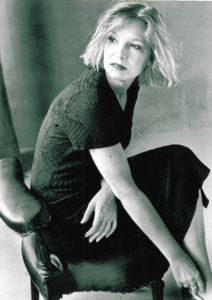 Kaye Gibbons was born in Nash County, NC, in 1960 to Alice Dorothea Gardner and Charles Batts, a tobacco farmer. After their deaths, she lived with different relatives before settling in with her brother and his wife in Rocky Mount. She graduated from Rocky Mount Senior High School in 1978 and received a full scholarship from the North Carolina Department of Veterans Affairs, awarded to children of wartime veterans. She attended North Carolina State University and later transferred to UNC-Chapel Hill to study Southern Literature with Louis Rubin. In 1984, she married Michael Gibbons, a landscape architect. They lived in Raleigh.
Kaye Gibbons was born in Nash County, NC, in 1960 to Alice Dorothea Gardner and Charles Batts, a tobacco farmer. After their deaths, she lived with different relatives before settling in with her brother and his wife in Rocky Mount. She graduated from Rocky Mount Senior High School in 1978 and received a full scholarship from the North Carolina Department of Veterans Affairs, awarded to children of wartime veterans. She attended North Carolina State University and later transferred to UNC-Chapel Hill to study Southern Literature with Louis Rubin. In 1984, she married Michael Gibbons, a landscape architect. They lived in Raleigh.
That same year, at twenty-four, she wrote her first novel, Ellen Foster, which was published by Algonquin Books of Chapel Hill. Louis Rubin founded the company in 1982. Praised as an extraordinary debut, Eudora Welty said that “the honesty of thought and eye and feeling and word” mark the work of this talented writer, and Walker Percy said, “Ellen Foster is a Southern Holden Caulfield, tougher perhaps, as funny . . . a breathtaking first novel.” In 1987, the novel won the Sue Kaufman Prize for first fiction from the American Academy and Institute of Arts and Letters, a Special Citation from the Ernest Hemingway Foundation, the Louis D. Rubin Writing Award, and other major awards. Now a classic, it is taught in high schools and universities, often teamed with The Adventures of Huckleberry Finn, Catcher in the Rye, and To Kill a Mockingbird. The book has been widely translated, frequently performed in theatres throughout the United States and was produced by Hallmark Hall of Fame for CBS, starring Emily Harris and Jenna Malone.
Published in 1989, A Virtuous Woman also received wide praise in the United States and abroad. It is the story of an unlikely marriage, told in the voices of a dying wife and her widowed husband. The San Francisco Chronicle called it, “A small masterpiece.” The Times Literary Supplement said it, “dares to do the ordinary thing, to transfigure the commonplace into a plain language that speaks with…complexity.” Both Ellen Foster and A Virtuous Woman were chosen together as Oprah Book Club selections in 1998, leading the New York Times bestseller list for many weeks.
In 1989 Gibbons received a grant from the National Endowment for the Arts to write a third novel, A Cure for Dreams, which was published by Algonquin in 1991. Writing about three generations of women, she used transcripts from the Federal Writers’ Project of the Great Depression, housed at Wilson Library in Chapel Hill. She said she discovered for the first time “the voice of ordinary men and women as a pure form of art and force of nature” and realized those voices would carry her through every novel she wrote. The Los Angeles Times Book Review said it is, “Full of unforgettable scenes and observations, characters drawn surely and sharply, and writing that is both lyrical lightning keen.” The novel won the PEN Revson Award for the best work of fiction published by an American writer under thirty-five years of age, the Oklahoma Homecoming Award, the Sir Walter Raleigh Award for Fiction from The Historical Book Club of North Carolina, and the Nelson Algren Heartland award for fiction from the Chicago Tribune.
When Charms for the Easy Life was published by G. P. Putnam’s Sons in 1993, it became a New York Times bestseller and prompted a Time magazine reviewer to say, “some people might give up their second-born to write as well as Kaye Gibbons.” This novel takes place between 1910 and 1945 in the home of three generations of highly intelligent and forthright eastern North Carolina women, and was filmed by Showtime Productions, aired in October 2001, starring Mimi Rogers and Gina Rowlands. Sights Unseen, published by G. P. Putnam’s Sons in 1995, was also a national bestseller and a winner of the Critics Choice Award from the San Francisco Chronicle.
The following year, G. P. Putnam’s Sons published her sixth novel, On the Occasion of My Last Afternoon, set during the Civil War. The Orlando Sentinel found it to be, “A muscular narrative that humanizes all sides of that bloody conflict—North and South, Black and white, male and female.” Other reviewers called it “a book of saints, sinners, and sorrows offering much pleasure,” “another cause for accolades” and many regarded it as her most brilliant to date. She was designated “one of the most lyrical writers working today” by Entertainment Weekly.
In 1996 Gibbons became the youngest writer to receive the Chevalier de L’Ordre des Arts et des Lettres, recognizing her contribution to French literature. She spoke at the Pompidou Center in Paris and at the University of Rennes. She has read and lectured to sold-out audiences from New York to Seattle. In 1998, she received the North Carolina Award for Literature, and in 1999, North Carolina State University awarded her the honorary degree of Doctor of Humane Letters. She also received the Carolina Alumni’s Distinguished Young Alumni Award and was invited to become a member of the Fellowship of Southern Writers. She was made a member of the YWCA Academy of Women, served as a judge for the Robert F. Kennedy Book Awards, and wrote the introduction to the Modern Library Edition of Kate Chopin’s The Awakening and Other Stories.
Divining Women, published by G. P. Putnam’s Sons in 2004, is set during the influenza epidemic of 1918. She also completed The Other Side of Air that year, which was left unfinished after the death of her close friend, the writer Jeanne Braselton. The sequel to Ellen Foster, The Life All Around Me By Ellen Foster, was published by Harcourt in 2005.
She is currently writing a memoir about the intersection of mental illness and creativity in her work. She has spoken and written about the need to remove the stigma from illnesses, like bipolar disorder, which she was diagnosed with in 1981. She has three daughters, Mary, Leslie, and Louise, and three granddaughters. She lives in Raleigh.
EXCERPT
from Ellen Foster
When I was little I would think of ways to kill my daddy. I would think of ways to kill my daddy. I would figure out this or that way and run it down through my head until it got easy.
The way I liked best was letting go a poisonous spider in his bed. It would bite him and he’d be dead and swollen up and I would shudder to find him so. Of course I would call the rescue squad and tell them to come quick something’s the matter with my daddy. When they come in the house I’m all in a state of shock and just don’t know how to act what with two colored boys heaving my dead daddy onto a roller cot. I just stand in the door and look like I’m shaking all over.
But I did not kill my daddy. He drank his own self to death to death the year after the County moved me out. I heard how they found him shut up in the house dead and everything. Next thing I know he’s in the ground and the house is rented out to a family of four.
All I did was wish him dead real hard every now and then. And I can say for a fact that I am better off now than when he was alive. I live in a clean brick house and mostly I am left to myself. When I start to carry an odor I take a bath and folks tell me how sweet I look.
There is a plenty to eat here and if we run out of something we just go to the store and get some more. I had me a egg sandwich for breakfast, mayonnaise on both sides. And I may fix me another one for lunch.
Two years ago I did not have much of anything. Not that I live in the lap of luxury now but I am proud for the schoolbus to pick me up here every morning. My stylish well-groomed self standing in the front yard with the grass green and the hedge bushes square.
I figure I made out pretty good considering the rest of my family is either dead or crazy.
Every Tuesday a man comes and gets me out of social studies and we go to a room and talk about it all.
Last week he spread out pictures of flat bats for me to comment on. I mostly saw flat bats. Then I saw big holes a body could fall right into. Big black deep holes through the table and the floor. And then he took off his glasses and screwed his face up to mine and tells me I’m scared.
I used to be but I am not now is what I told him. I might get a little nervous but I am never scared.
Oh but I do remember when I was scared. Everything was so wrong like somebody had knocked something loose and my family was shaking itself to death. Some wild ride broke and the one in charge strolled off and let us spin and shake and fly off the rail. And they both died tired of the wild crazy spinning and wore out and sick. Now you tell me if that is not a fine style to die in. She sick and he drunk with the moving. They finally gave in to the motion and let the wind take them from here to there.
